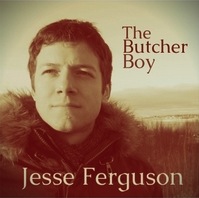 Jesse Ferguson
Jesse Ferguson
The Butcher Boy
Kunaki (2014)
Jesse Ferguson is blessed with one of the most resonant baritone singing voices around: the perfect instrument for singing anything from, as the liner notes of latest album The Butcher Boy puts it, “the Irish, English, Scottish, and American (folk) traditions”.
Beside the proper genetic heritage, Ferguson brings to his material years of performing in his native Ontario and, more recently, his current home in Cape Breton. He has also self-produced dozens of videos of traditional songs for YouTube that have collectively been viewed tens of thousands of times on his Bard Of Cornwall channel.
The Butcher Boy (distributed by Kunaki, LLC) features eleven tunes out of the venerable folk catalog, some familiar and some less so, but all will be a welcome addition to the collection of any devotee of this beloved genre and should also win some fans among those who are not.
Produced by Ferguson using the Mixcraft 6 program, to refer to the liner notes again, he also performs all vocals, harmonies, and instruments (including acoustic and electric guitar, mandolin, bodhran, Juice harp, and fife, as well as various percussion instruments).
Besides Ferguson’s impressive vocal abilities, he has a deep knowledge and reverence for his material and a knack for finding arrangements that never twist the material away from its roots but also never become repetitive and bland. Both vocally and instrumentally, with no faux sentimentality or wishy-washy rhythms (a chronic fault of some traditional recordings I’ve listened to over the years), Ferguson puts the story-telling of his material front and centre, an acknowledgement of its origins in the humble homes and taverns it first found its audience.
For example, a well-sung rendition of “The Amsterdam Maid”, with multi-track a cappella harmonies accompanied by the rhythm of a bodhran, is followed by a delicate and intricate instrumental tune, “Planxty Fanny Power”.
A playful, old time-y version of the American folk ballad, “The Ballad Of Jesse James”, livens up the album mid-way through with Ferguson doing a lyric re-write so that the outlaw robs the “Glendale train” (it must have been Buddy MacMaster’s day off).
I listened to the CD three times before I read the liner notes and discovered “She Walks In Beauty” is an original musical setting by Ferguson of Lord Byron’s poem. His melody fit in perfectly with the traditional style of his other tunes and Ferguson’s vocal performance was especially emotive (much like his version of Robbie Burns’ “My Love is Like a Red, Red Rose”).
The playfulness of Ferguson’s delivery of that old pub sing-along chestnut, “The Irish Rover”, had me wishing, for the only time listening to the album, I was in an actual pub singing along with a roomful of people.
Cape Breton union supporters will have fun with the two closing tunes, “The Blackleg Miner”, a fiery slag against scab labour with a sinister guitar lick underlining the message, and a rousing chorale version of “Byker Hill” sung like it might been done in a coalfield alehouse with whatever instruments were close at hand (in this case, sandpaper block and frying pan). “Colliery men for ever more” indeed.
Jesse Ferguson is playing The Old Triangle Pub on Sydney’s Charlotte Street, Saturday, May 31, and Saturday, June 21, from 4:45pm to 8pm.

